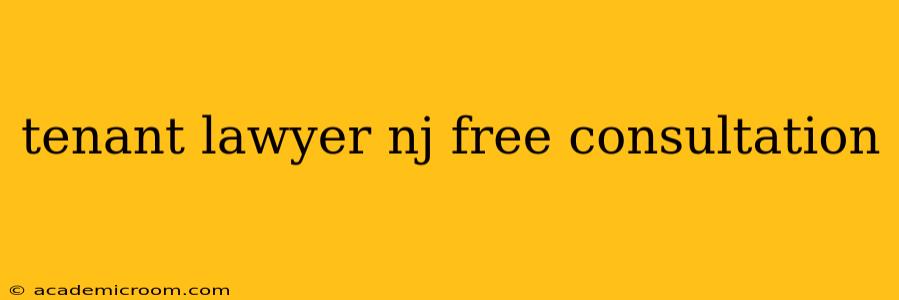Finding yourself in a landlord-tenant dispute in New Jersey can be incredibly stressful. Navigating complex lease agreements, understanding your rights, and advocating for yourself can feel overwhelming. That's where a knowledgeable tenant lawyer comes in. Many NJ tenant lawyers offer free consultations, providing a crucial first step towards resolving your legal issues. This guide will help you understand the process of finding and utilizing a free consultation with a tenant lawyer in New Jersey.
What Happens During a Free Consultation with a Tenant Lawyer in NJ?
A free consultation typically lasts between 15-30 minutes. During this time, the lawyer will:
- Gather Information: They'll ask you about your situation, including details about your lease, the nature of the dispute, and any relevant documentation you possess (like lease agreements, emails, photos of damages). Be prepared to concisely explain your issue.
- Assess Your Case: The lawyer will analyze the information you provide to determine the merits of your case and the potential legal strategies available.
- Explain Your Rights: They'll clarify your rights as a tenant under New Jersey law.
- Discuss Potential Outcomes: The lawyer will outline the potential outcomes of your case, including the likelihood of success and the potential costs involved.
- Recommend a Course of Action: Based on their assessment, they will suggest the best approach for resolving your situation. This might include negotiation, mediation, arbitration, or litigation.
How to Find a Tenant Lawyer in NJ Offering Free Consultations?
Several avenues exist to find a qualified NJ tenant lawyer offering free consultations:
- Online Search: Search online using keywords like "tenant lawyer NJ free consultation," "NJ landlord tenant attorney," or "free legal advice for tenants NJ." Pay close attention to lawyer websites for information on their services and whether they offer free consultations.
- Legal Aid Organizations: Legal aid societies and non-profit organizations often provide free or low-cost legal assistance to low-income tenants facing eviction or other housing issues. These are excellent resources if you have limited financial means.
- Bar Association Referrals: The New Jersey State Bar Association may offer referral services to connect you with lawyers in your area.
- Referrals: Ask friends, family, or colleagues for recommendations. Word-of-mouth referrals can be invaluable.
What Should I Prepare Before My Free Consultation?
To make the most of your consultation, prepare the following:
- Detailed Summary of Your Situation: Write a concise summary of your landlord-tenant dispute, outlining the key facts and events.
- Copies of Relevant Documents: Bring copies of your lease agreement, any correspondence with your landlord, photos or videos documenting damages, and any other relevant paperwork. Do not bring originals unless specifically requested.
- List of Questions: Prepare a list of questions to ask the lawyer. This shows you're prepared and allows you to get the most from the consultation.
Are There Any Fees Associated with a Free Consultation?
While the consultation itself is typically free, be aware that if you decide to hire the lawyer, you'll likely incur legal fees for their services. These fees vary greatly depending on the lawyer, the complexity of the case, and the amount of work involved. Discuss fees upfront with any lawyer you consider hiring.
What if My Case Doesn't Qualify for a Free Consultation?
Some lawyers might offer reduced-fee services for tenants facing financial hardship. Inquire about payment options and explore resources such as legal aid organizations if you cannot afford legal representation.
What are the Types of Landlord-Tenant Disputes Handled by NJ Tenant Lawyers?
New Jersey tenant lawyers handle a wide range of landlord-tenant disputes, including:
- Eviction: Fighting unlawful evictions and ensuring you have proper notice and legal recourse.
- Lease Violations: Addressing issues such as rent increases, lease breaches, and failure to make necessary repairs.
- Habitability Issues: Advocating for repairs to ensure your living space meets minimum habitability standards.
- Security Deposit Disputes: Resolving conflicts over the return of security deposits.
- Discrimination: Addressing issues related to housing discrimination based on protected characteristics.
By utilizing this guide and taking proactive steps, you can confidently navigate the process of finding a qualified tenant lawyer in New Jersey and secure the legal assistance you need. Remember, seeking early legal advice can significantly improve your chances of a favorable outcome.
